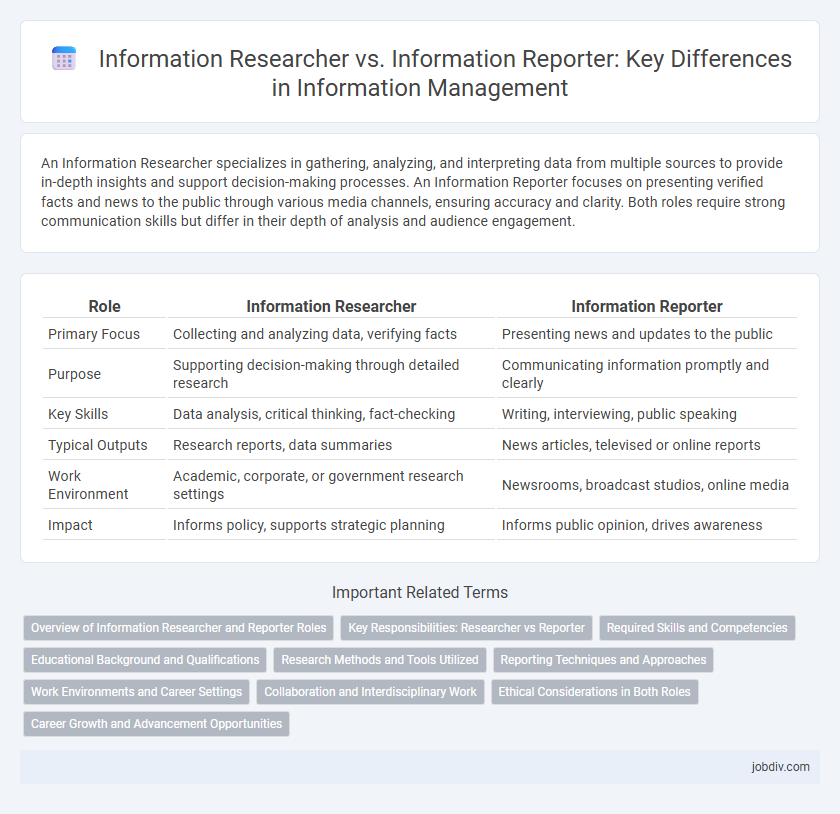An Information Researcher specializes in gathering, analyzing, and interpreting data from multiple sources to provide in-depth insights and support decision-making processes. An Information Reporter focuses on presenting verified facts and news to the public through various media channels, ensuring accuracy and clarity. Both roles require strong communication skills but differ in their depth of analysis and audience engagement.
Table of Comparison
| Role | Information Researcher | Information Reporter |
|---|---|---|
| Primary Focus | Collecting and analyzing data, verifying facts | Presenting news and updates to the public |
| Purpose | Supporting decision-making through detailed research | Communicating information promptly and clearly |
| Key Skills | Data analysis, critical thinking, fact-checking | Writing, interviewing, public speaking |
| Typical Outputs | Research reports, data summaries | News articles, televised or online reports |
| Work Environment | Academic, corporate, or government research settings | Newsrooms, broadcast studios, online media |
| Impact | Informs policy, supports strategic planning | Informs public opinion, drives awareness |
Overview of Information Researcher and Reporter Roles
Information researchers analyze, evaluate, and synthesize data to generate comprehensive insights that support decision-making and strategic planning. Information reporters gather, verify, and present factual information in clear, concise formats, often for news outlets or organizational communication. Both roles require strong analytical and communication skills but differ in focus, with researchers emphasizing in-depth analysis and reporters prioritizing timely and accurate information dissemination.
Key Responsibilities: Researcher vs Reporter
Information Researchers analyze data to uncover patterns, verify sources, and provide comprehensive insights that support decision-making processes. Information Reporters gather facts, conduct interviews, and deliver timely news stories to inform the public with accuracy and clarity. Researchers focus on in-depth analysis and synthesis, while Reporters emphasize immediate reporting and audience engagement.
Required Skills and Competencies
Information researchers require advanced analytical skills, proficiency in data collection methods, and expertise in evaluating information sources to generate in-depth insights. Information reporters must excel in communication, quick fact-checking, and the ability to present accurate news under tight deadlines. Both roles demand strong critical thinking and attention to detail, but researchers emphasize investigation and interpretation, while reporters focus on clarity and timely dissemination.
Educational Background and Qualifications
Information Researchers typically hold advanced degrees in information science, library science, or related fields, emphasizing research methodologies, data analysis, and critical evaluation skills. Information Reporters often have educational backgrounds in journalism, communications, or media studies, focusing on storytelling, reporting techniques, and ethical standards in news production. While both roles require strong information handling capabilities, researchers prioritize data accuracy and interpretation, whereas reporters emphasize clear, concise information delivery to the public.
Research Methods and Tools Utilized
Information researchers utilize qualitative and quantitative research methods such as surveys, interviews, and data analysis software like SPSS or NVivo to gather and interpret complex data. Information reporters rely on tools like content management systems, news databases, and real-time information feeds to collect and verify current events efficiently. Both roles require proficiency in digital tools, but researchers emphasize in-depth analysis while reporters focus on timely information dissemination.
Reporting Techniques and Approaches
Information Researchers employ systematic data collection, critical analysis, and advanced verification techniques to ensure accuracy and depth in their findings. Information Reporters prioritize clear, concise storytelling, using observational skills and structured interviews to convey information effectively to their audience. Both roles utilize ethical standards but differ in their emphasis on investigative rigor versus accessible communication.
Work Environments and Career Settings
Information researchers primarily work in academic institutions, corporations, government agencies, or specialized research firms where they analyze data, conduct surveys, and generate comprehensive reports. Information reporters operate mainly in media outlets, including newspapers, television stations, and online platforms, gathering news, interviewing sources, and delivering timely updates. Both careers require adaptability to dynamic work environments but differ in focus, with researchers emphasizing in-depth analysis and reporters prioritizing real-time information dissemination.
Collaboration and Interdisciplinary Work
Information researchers and information reporters collaborate by combining rigorous data analysis with real-time storytelling to deliver comprehensive insights. Interdisciplinary work bridges expertise from fields such as data science, journalism, and communication, enhancing the accuracy and relevance of reported information. This synergy ensures that complex data is translated into accessible narratives, facilitating informed decision-making across diverse sectors.
Ethical Considerations in Both Roles
Information Researchers prioritize accuracy, confidentiality, and intellectual property rights, ensuring data integrity and ethical sourcing throughout their investigative processes. Information Reporters adhere strictly to truthfulness, impartiality, and transparency, balancing public interest with privacy concerns while verifying facts before dissemination. Both roles face ethical challenges related to misinformation, bias, and responsible handling of sensitive information, demanding rigorous adherence to professional codes of ethics.
Career Growth and Advancement Opportunities
Information Researchers typically experience faster career growth due to their role in analyzing complex data, which is highly valued in sectors like technology, academia, and market research. Information Reporters focus on gathering and presenting facts, often progressing within media and journalism, but may face slower advancement without specialized skills. Advanced technical expertise and continuous learning significantly enhance career advancement opportunities for Information Researchers compared to Information Reporters.
Information Researcher vs Information Reporter Infographic

 jobdiv.com
jobdiv.com